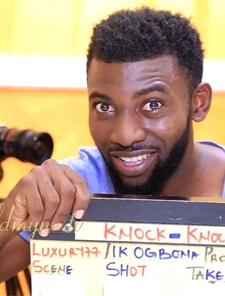Odiba Alfred, popularly known as Director D and Drama Dramin, is a multitalented personality. His areas of speciality include Cinematography, Directing, Editing and Music Production. During his teenage days, he fell in love with music, and this led to a short stint as a recording and performing artiste, but then he gave in to his strong passion for cinematography and chased it relentlessly.
He has worked with several Nollywood producers, directors, marketers and household names such as, Afe Olumowe, Pascal Amanfo, Ik Ogbonna, Gold pictures, Ikey Ojeogwu, Ebube Nwagbo Oyin Alex to name a few. “Circumstance” his first attempt at movie making, was shortlisted for the award category but lost to “Hex” by Clarence Peters.
Odiba Alfred has directed, edited and done cinematography for series of projects, including television series, music videos, documentaries, events and commercials for different brands like Dettol, Itel, Luxury Seventy Seven, Travelfix.Co, Chocolate City, Reloaded Magazine, Felabration, Junior Achievement and many more.
Chat with Odiba Alfred
1. Can you tell us about the greatest moment in your film career?
My greatest moment yet was the day I received an email from an award hosting committee (AFRIFF) in 2015(the year I started my directing career), that my short film titled “Circumstance” had been shortlisted for the award competition. It felt good to see my effort acknowledged by professionals.
2. During the creative process, movies evolve, and this evolution is sometimes more obvious after the editing process. It can be very difficult to reconcile what we intended and what we achieved. Has this happened to you? How did you move through it?
Well, it’s always difficult to reconcile my initial idea with my final product. Previewing my final production is often a horrible experience because I don’t cut myself any slack when criticizing my own work. Especially at this phase of my career where I’m compelled to make a lot of low budget movies to remain in business, but I believe that it will get better with time.

3. Success brings attention, but success is created on the back of failure. We learn better from the experiences that don’t work, and yet we only discuss successes, not failures. What is your approach to failure? How does it change you and your creative process?
I’m very stubborn and persistent when it comes to pursuing my dreams, and I strongly believe in the unconventional approach to success. I can categorically say my growth is as a result of the lessons I have learnt from my mistakes. I have never been shy or scared to fail. I have grown to learn that every mistake comes with a gift of knowledge, and this knowledge is what guides me in my creative process.


